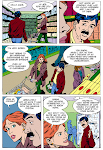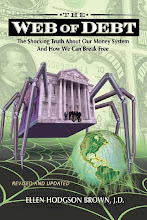Bramleyn kirjasta löytyy paljon juttua netistä. Se löytyy myös kokonaisuudessaan on-line versiona. Suosittelen kirjaa kaikille avomielisille ja uteliaille. Kirja on ollut hyvin ratkaiseva monen ihmisen ajattelun kehitykselle. Esim saksalainen kirjailija Jan Udo Holey kertoo ensimmäisen oman kirjansa esipuheessa miten juuri Bramley sai hänet heräämään ja aloittamaan oman kirjallisen tuotantonsa.
Mutta palataaksemme Bramleyn kirjaan: Erityisesti tämän blogin aihepiiriä koskevat luvut - "A New Aristocracy" - sekä "Funny Money".
"The newly-weakened monarchies and parliamentary governments allowed for greater power to be assumed by a new institution being installed by the revolutionaries: a new banking and monetary system. This new monetary system was a major element of the revolutions of the 16th, 17th, and 18th centuries, yet this fact is only minimally discussed in the majority of history books. Those who ran, and still run, the new monetary system have been aptly labeled by one author, Howard Katz, “the paper aristocracy.”
"This new money was a type of paper currency that could have its value deliberately and systematically diminished through a process known as “inflation.” It is the type of money still in use today. This new money, and the institutions which arose from it, have had an enormous impact on our modern civilization. We cannot fully appreciate the effects of Protestantism and the revolutions which arose out of it without comprehending just how the new money system works." (.....)
"The inevitable result was the enrichment of the careful goldsmith-turned-banker at the cost of the impoverishment of other people in the community.
That impoverishment was manifested either in the people’s need to give up things of value or in their need to toil longer to create the wealth needed to repay the banker. If the goldsmith was not careful and his monetary bubble burst, the people around him suffered anyway due to the disruption caused by the collapse of his bank and the loss of the value of his notes still in circulation.
Such was the birth of modern banking. Many people feel that it is an inherently dishonest system. It is. It is also socially and economically destabilizing, yet all of the world’s major monetary and banking systems today operate on a close variation of the system I just described."
The gold standard was certainly a terrific idea for those people who owned plenty of gold and silver, but it created an artificial reliance on a commodity that is not nearly as useful as many other products. To base an entire monetary system on a single commodity is better than basing it upon no commodities at all, but even under a gold standard paper notes will far exceed the metals used to back the notes. "
"The best solution is to root a money supply firmly in a nation’s entire valuable output so that the money acts as an accurate reflection of that output. "




Ei kommentteja:
Lähetä kommentti